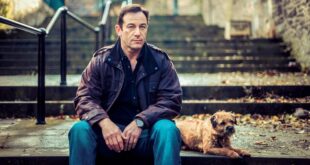
“Karl Weber leaped into the air before the ball had hit the back of the net, his frenzied cheers as indecipherable as the thousands that surrounded him. The entire Cannstatter Kurve had come alive at a moment of individual brilliance from VfB Stuttgart’s iconic number 10 Bobby Wright, his 40-metre run ending with a rocket of a shot from the corner of the penalty area. VfB were 4-0 ahead with only 15 minutes to go, making a comeback near impossible for TSG Hoffenheim.
It was the kind of scoreline that demanded celebration, especially when it was achieved against one of the club’s biggest rivals. And Weber – like so many around him – was going to do exactly that. He was not the only one. Wright’s strike had set off an explosion of uncontrolled euphoria.
No one watched as the ball was retrieved from the goal or reset in the centre circle, ready for the final stretch of the match to begin. Instead, the cheering continued as minutes passed, with fans congratulating one another as if they had scored the four goals themselves. This was why the Cannstatter Kurve fans were the very last to see death’s arrival at the MHP Arena.
Weber barely registered the first of the gunshots. They came when his head was buried deep into the shoulder of his much taller friend, Philipp Rüdiger. Weber and Rüdiger had been coming to VfB together – along with their pal Florian Aber – for close to 30 years.
None of the three men noticed the sudden change in atmosphere. The second shots came seconds later. This time, Weber noticed the noise, but his mind was still too distracted to even wonder what the cause might be. That changed in a moment – with a third, fourth and fifth burst, these almost simultaneous. Weber looked around in confusion.
His first thought was firecrackers, but something inside him was saying “no”. Perhaps it was the volume. Too loud for stadium fireworks. Or perhaps it was the inherent violence that seemed to accompany the sound. Whatever it was, his instinct was proved correct by the sound of a sixth, seventh and eighth burst – and the realisation that what he had thought were cheers of joy had become screams of terror.
He turned towards Aber to his right, intending to shout an instruction. His friend beat him to it. “RUN!” Aber pushed Weber forward as he screamed, his words drowned out by the noise around them, and then eclipsed completely by another round of shots, this one much closer. The entire Cannstatter Kurve had registered the threat and a whole section of the stand seemed to move as one, sweeping a terrified Weber, Aber and Rüdiger in its wake.
It was all he could do to stay upright in the crushing embrace of the crowd, his breathing strained as bodies pressed in from all sides. Weber tried to struggle free. He was desperate for a better view of where the human wave was taking him and concerned to catch a glimpse of his two friends, now lost to him somewhere in the throng.
It was an impossible task. Thousands of people had merged into a single, irresistible and mindless entity, driven by just one thing: the urge to escape. Against that, one man could do nothing. More shots. More screams. The crowd seemed to tighten in response. As if those on the outside were trying to fight their way in.
It worsened the already unbearable constriction, with bodies on all sides pushing deep into Weber’s chest, shoulders and back. In that moment it was impossible to breathe at all: his lungs and his rib cage could do nothing to overcome the pressure that now surrounded him. He fought for breath. For space.
But he knew that he was failing. That he could not survive this. Relief came with another round of fire. The sound alone told Weber that these were the closest yet. A mix of blood and other bodily matter confirmed that instinct, hitting his face as it was expelled from some unseen victim.
The proximity of the gunman somehow dispersed a portion of the crowd. It eased the pressure on Weber, allowing him to breathe for what felt like the first time in minutes. It also cleared a line of sight. For the first time he could see a gunman.
He registered the features in the blink of an eye. The man was Arabic. He was dressed in a brown, military-style one-piece that resembled a flight suit. And he was carrying an assault rifle, which in that moment he turned away from Weber’s direction and towards a small group that had broken from the crowd.
A group, Weber now saw, that included several small boys. “NO!” His scream did nothing, leaving Weber to watch in horror as the gunman opened fire, the multi-round burst accompanied by a shout of his own: “ALLAHU AKBAR!”
It was the worst sight of Weber’s life. The most horrific act he had ever witnessed. It left him physically stunned. Unable to move, he watched as the same gunman fired two more bursts into the fleeing crowds, both times with the same celebratory shout to his god. The same paralysis remained even as the man noticed him, and so Weber remained frozen as the gun was turned towards him. Had the man had a chance to shoot, Weber would be dead. And yet he felt no relief when, instead of opening fire, the gunman was riddled with bullets from an unseen source, slamming him hard to the ground.
“The intense heat of the Stuttgart night seems an apt backdrop for the hell wrought here today.” Georg Miller read the words back to himself four times. Three in his head, then once aloud.
They passed the silent examination – they were fine on paper – but fell at the final hurdle. You can write this s***, he told himself, but you sure as hell can’t say it. Using his cheap black biro, he put a line through his own try-hard prose. Then he closed his battered leather notebook and stuffed it into his satchel case. The words weren’t coming, and nor would they. Not yet. Not while he felt like this.
He looked outside, through the wide doors of the main hospital entrance. What he wanted most right now was a cigarette, but it was going to take something a lot stronger and a lot less legal to touch the sides after this one.
He turned his gaze back towards the deeper interior of the hospital. From here, he could see the overcrowded reception area. It had taken Georg almost two hours to travel from the Hamburg office of the Komet news magazine to Stuttgart Airport, then 30 minutes more to reach the Marienhospital, where most of the wounded and the dying had been brought in a desperate effort to save their lives.
By the time he arrived, a clear three hours had passed, yet still the medics had not seen half of the wounded. That was the scale of the horror that had brought him and so many other reporters here. Even now, the details remained sparse.
The police had said very little to the public or to the press and Georg had been unable to get much sense from anyone inside the hospital. The medics were too busy, the victims mostly in no condition to talk, and the sight of so many dead and dying had left Georg too shaken to formulate any kind of insightful inquiry. Three hours since the first word of the atrocity had reached him and still all he knew were the same scant details as had been shared with the rest of the world: more than 30 football supporters dead and who knew how many more wounded, with all the gunmen themselves killed by GSG-9, the elite special forces unit of the Bundespolizei.
He walked slowly as he moved back inside, fearful of the sights about to greet him.
One of the largest hospitals in Stuttgart and boasting by far the city’s biggest emergency centre, the Marienhospital was still unfit for the purpose to which it was now being put.
Georg kept his eyes fixed straight ahead and tried to ignore what was happening around him, but it was impossible to miss the huge numbers of bloody and barely covered corpses left on abandoned trolleys in the hospital corridor, dumped there by staff too busy fighting for the living to worry about the dignity of the dead.
It was barely two months since Bonn had been the scene of the worst terrorist atrocity since reunification. The worst until tonight. What had followed Bonn remained an open wound. Wild allegations and false identifications had been fuelled by social media, by the more extreme wings of the press and by ruthlessly populist politicians.
The result was mass protests and misdirected violence. Mosques were targeted, Islamic businesses burned out and scores of innocent Muslim men injured, two of them fatally. It was the closest thing Georg had ever seen to the images in his history books.
But the Germany in which Georg had been raised was not the Germany of today. For half a century and more, the democratic remnant that had arisen from the Second World War had been the perfect partnership of liberal politics and society.
For some – for many, Georg now realised – that had been an ideological swing too far.
A forced repositioning based on collective guilt. What had once been Left or Right and open to debate had become right or wrong, with all debate closed off.
It was a recipe for mass unrest, reminding Georg of what his grandfather Peter had said for years: “When you outlaw the truth, you pave the road to hell.”
Outside again in the smoking area, an elderly man caught his eye, older than anyone else there and wearing an inpatient’s gown. He had no cigarette or vape and his stare was fixed on Georg. As his view became clearer, he registered the watching man’s expression. It was unusual: a mixture of recognition and something close to horror.
As he approached, the old man was shaking and breathing hard. He turned to face Georg, their eyes locking, and within moments the confusion on the older man’s face was replaced with a look of unmistakable recognition. “It can’t be.”
His voice was trembling but still deep and strong. He moved closer, his gaze studying Georg’s features. “It can’t be.” Georg watched silently as the old man’s eyes scanned him from head to toe, then back up again.
The fear that had been there moments before was gone. In its place? Questions. “But you’re dead,” he said, as much to himself as to Georg. “You’re dead.”
Georg kept his voice low and gentle. “Who am I?”
The old man stepped back. “Who am I?” Georg asked again.
His eyes narrowed. “You know who you are.” There was an irritated tone to his voice that had not been there before, his words spoken with almost a hiss.
The old man straightened his hunched back and brought himself to his tallest possible height. For the first time Georg could see that he had once been a big man.
The aged face had changed, too. The fear was gone. So was the confusion. What was left was surprising: a mix of arrogance and defiance.
“You know who you are, Horst Miller. And you know who I am. Now let us not play games. If you have come for me, let us face it like men.”
Georg felt a chill descend his spine. It was as shocking as a sudden blow to the gut. They were the last two words he’d expected. Because the old man was wrong. Georg was not Horst Miller. But he was Horst Miller’s son. And Horst Miller was dead.”
Edited extract by Matt Nixson from Revenge of Odessa by Frederick Forsyth with Tony Kent (Bantam, £22)
 Latest Breaking News Online News Portal
Latest Breaking News Online News Portal






